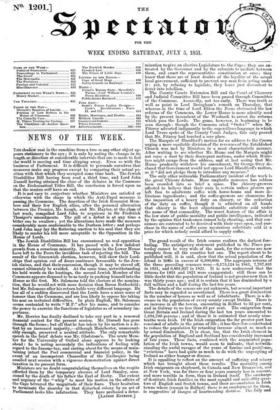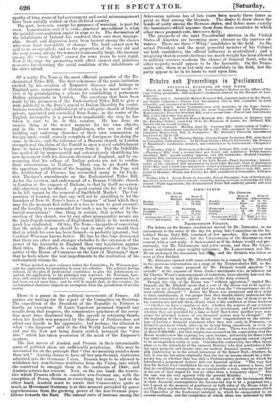The grand result of the Irish census realizes the darkest
fore- boding. The anticipatory statement published in the Times yes- terday cannot be very wide of the mark, for the returns are now complete from all the counties but one. The report about to be published will, it is said, show that the actual population of the island is little in excess of 6,500,000. The aggregate returns of the three preceding censuses were-8,175,124 in 1841, '7,767,401 in 1831, and 6,801,827 in 1821. It is now understood that the returns for 1831- and 1821 were exaggerated : still there can be little doubt that the population of Ireland is not greater now than it was thirty years ago ; and it is certain that it has diminished by a full million and a half during the last ten years. The details of the census are yet unknown, but several important facts may be regarded as ascertained. There is a great diminution in the number of houses as well as of inhabitants. There is a de- crease in the population of every county except Dublin. There is an increase in all the towns, amounting in Belfast to 32 per cent,. and in Galway to no less than 43 per cent. The emigration from Great Britain and Ireland during the last ten years amounted to 1,494,786 persons ; and of those it is estimated that nearly nine- tenths were Irish. Of the Irish emigration the far greater part has consisted of adults in the prime of life ; it has therefore contributed to reduce the population by retarding increase almost as much as by actual diminution. It is clear, too, that the Irish element in theAsopulation of England and Scotland has considerably increased of late years.' These facts, combined with the augmented popu- lation of the Irish towns, would seem to indicate, that notwith- standing the awful ravages of the years of famine and pestilence, "evictions" have had quite as much to do with the unpeopling of Ireland as either hunger or disease. It is appalling to reflect on the amount of suffering and misery which has brought about these results. The mortality among Irish emigrants on shipboard, in Canada and New Brunswick, and at New -York, was for three or four years scarcely less in amount, and more terrible in form, than in Ireland itself. The surcharge of destitute Irish families in the most squalid and unhealthy quar- ters of English and Scotch towns, and their accumulation in Irish towns where (except in Belfast) there is no employment for them, is suggestive of images of heartrending distress. The folly and
apathy of long years of bad government and social mismanagement have been awfully visited on that ill-fated country.
The past, however, except for purposes of 'warning, is past for ever. Lamentation over it is vain ; practical amendment is what the painful contemplation ought to urge us to. The decimation of the inhabitants of Ireland has rendered their case more manage- able. Death and dispersion have been busiest among the classes who were least susceptible of change. The land cannot now be said to be overpeopled ; and as the proportion of the very old and the very young among the remnant is unusually large, the increase among the "mere Irish" cannot for some years be very rapid. Now is the time for promoting with effect earnest and judicious measures for elevating the social condition of the inhabitants of the sister island.



























